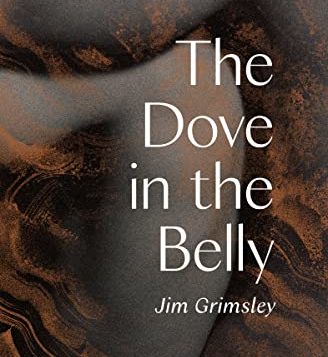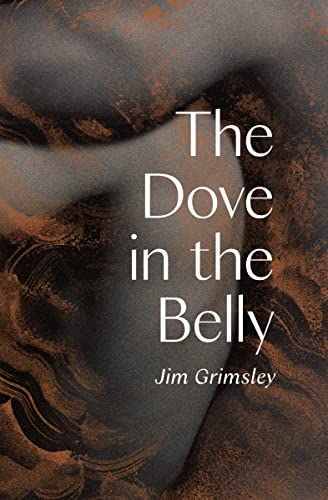OVER THE PAST few decades, Jim Grimsley has emerged as something of a star in the world of literary gay fiction. He first burst upon the scene in 1994 with Winter Birds, a harrowing look at an abusive family situation, and soon thereafter came out with Dream Boy (1995), a dreamlike story about a teenage boy’s obsession with another boy who may or may not be real. Other first-rate books like Boulevard, My Drowning, and Comfort and Joy ensued, as well as plays and a memoir, establishing him as one of his generation’s most notable gay writers.
Sexuality is nearly always newly emergent and tentative in Grimsley’s novels, with gay sexuality presented as something that asserts itself against strong social pressures. Similarly, an attraction to the forbidden—as well as the very real threat of violence or even death—nearly always hovers at the edge. Grimsley’s tenth novel, The Dove in the Belly, is a worthy but somewhat problematical work that ostensibly shares the theme of Dream Boy and Boulevard, that of a timid, newly out gay man who becomes obsessed with an apparently straight man, with the possibility of violence ever present.
One problem with this novel is that the relationship unfolds at such a leisurely pace. It’s not until page forty that Grimsley drops back and proceeds to give us a month-by-month recap of how the two got to where they are. Given this awkward unfolding, one wonders why he didn’t just start at the beginning and show us their evolution in the traditional way. Possibly owing to this storytelling strategy, Ben never quite emerges as a fully realized character, or a sympathetic one. Sure, it may be that Grimsley wanted the main focus to be Ronny and his quest for self-acceptance, but it’s still not clear why the narrative treats Ben, whom Grimsley refers to as “the big boy,” in such a detached and distancing way.
Grimsley’s dialogue, too, is slacker in this novel than one remembers from earlier novels, and so are the motives of his characters. It’s not at all clear why Ronny is attracted to someone whose treatment is so often abusive—he constantly refers to Ronny as “my faggot”—and who seems as likely to beat up his lover as to kiss him. This is not to say that there aren’t some wonderful passages in this book, as when Grimsley recounts how Ronny obsesses over the early uncertainties and delights of the unfolding relationship: “When he fell nearly to sleep a part of him would think, but Ben was here, but Ben was on top of me, surrounding me, and he said this, and this, and this. Ronny lingered over each word, each tone of voice, each change of expression. There was too much intoxication in the room for rest. … As if he had to catalogue each moment, sort it all, to make sure he remembered.”
Grimsley is a wise and experienced writer, and if The Dove in the Belly is not his best novel, it nevertheless has much to offer, including some historical background on the era of gay liberation in the 1970s (the book is set in 1976-77). Those were crazy and uncertain times, which is perhaps why Grimsley is ultimately cagey about whether Ronny and Ben’s relationship is destined to last. At the very least, we can be sure that Ronny has learned something about himself.
____________________________________________________







